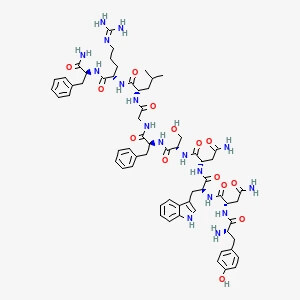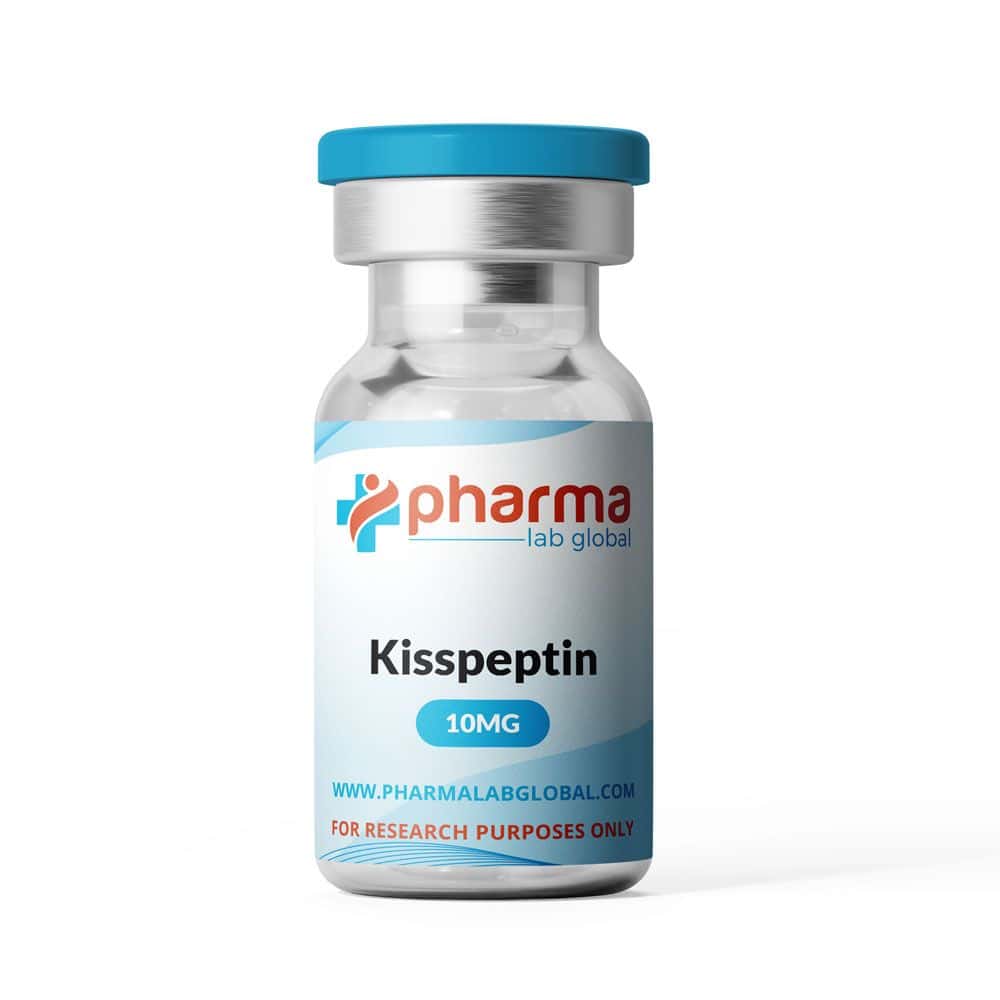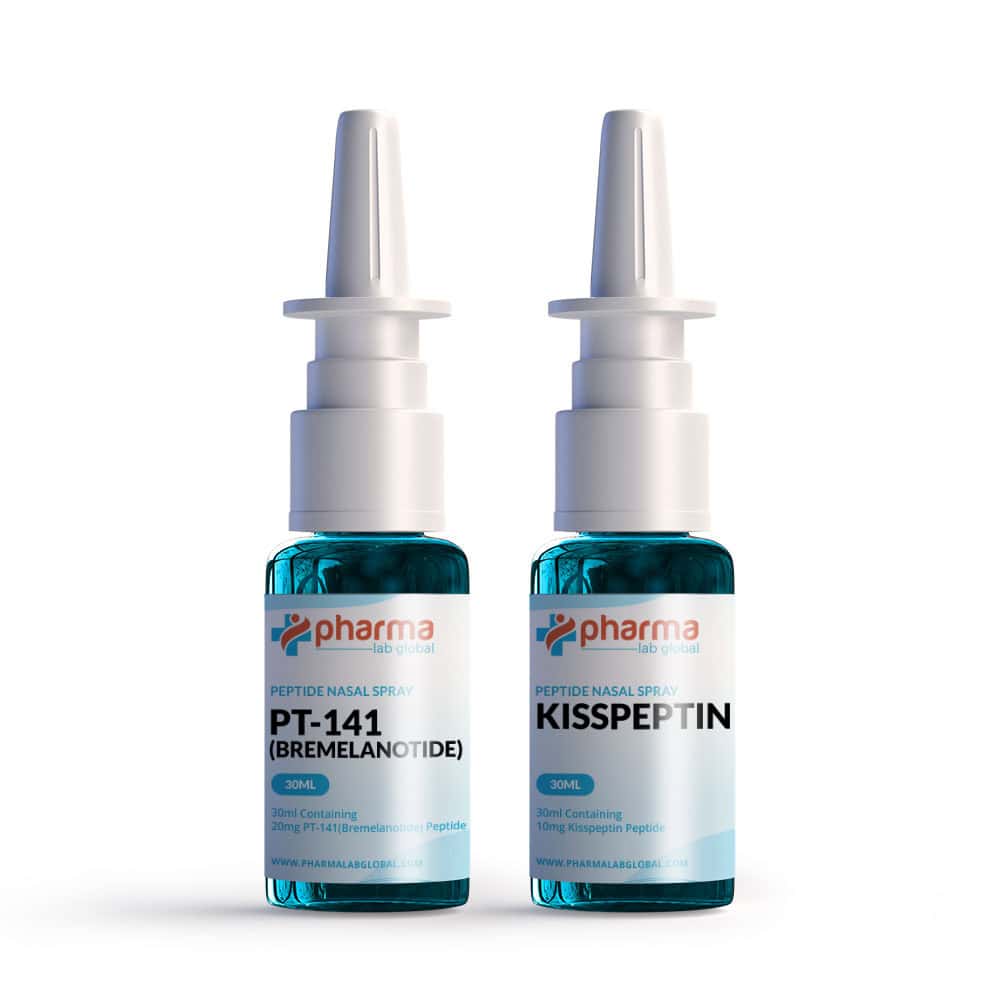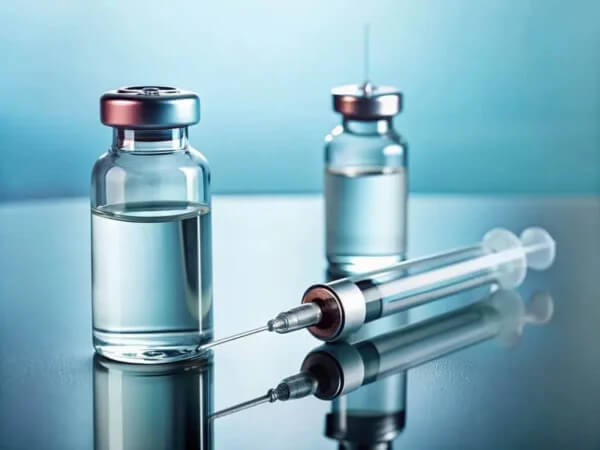Kisspeptin is a critical hormone and plays an important role in controlling the reproductive system. It is predominantly synthesized in the hypothalamus and functions as an important determinant signaling molecule by inducing gonadotropin-releasing hormone (GnRH) secretion. This, in response, cause the release of luteinizing hormone (LH) and follicle-stimulating hormone (FSH), hormones necessary for puberty, fertility and optimum reproductive health.
Other UK Research experts have discovered that Kisspeptin is also active in regulating sexual maturation and part of the menstrual cycle. It also affects, in ways beyond reproduction, behavior including mood and appetite. Kisspeptin peptides UK are being extensively studied for their potential therapeutic role in treating reproductive and hormonal disorders. Kisspeptin signalling is disrupted in disorders such as infertility and delayed puberty, emphasising its importance for human health and physiology.
Molecular Formula: C63H83N17O14
Peptide Sequence: H-Tyr-Asn-Trp-Asn-Ser-Phe-Gly-Leu-Arg-Phe-NH2
Molecular Weight: 5857 g/mol
Kisspeptin UK buy Kisspeptin amino acids for research use at competitive prices and highest purity, with worldwide.


UK Kisspeptin studies have suggested that it might have the following potential:
Holds the key to puberty, fertility and menstrual cycles by promoting GnRH release.
Has an important role in ovulation and sperm production to improve fertility.
A possible target molecule for treatment of infertility and delayed puberty.
Possibly affecting emotional and sexual behaviors.
Possible therapeutic role for certain cancers.
Peptide Vials of Kisspeptin 10mg.
Peptides delivered in sterile glass bottles must be reconstituted before utilizing. Browse all laboratory research supplies on the consumables category page.
The Kisspeptin peptide has been identified as an essential controller of the reproductive axis by binding to the G-protein-coupled receptor, GPR54 (KISS1R). Naturally occurring in the hypothalamus, kisspeptin acts through GPR54 on the gonadotropin-releasing hormone (GnRH) cell. This is followed by a series of signalling pathways to release GnRH from the hypothalamic-pituitary portal system. GnRH in turn stimulates the anterior pituitary gland to release luteinizing hormone (LH) and follicle-stimulating hormone (FSH) as part of the control mechanism for ovulation or development of in sperm in males.
The Kisspeptin receptor is inherently extremely sensitive to hormonal feedback - especially hormones such as estrogen and testosterone- so it can closely control when reproduction begins or ends. It further integrates environmental and diet cues, such as stress and energy status, to coordinate reproductive timing. UK The authors think this mechanism is a vital part of what makes Kisspeptin so important in regulating reproductive health, and might be used as a target for fertility disorders.
Peptide Nasal Sprays legality These are a non invasive, convenient and painless manner to explore Peptides!
Purchase Kisspeptin Nasal Spray for research purposes Minimum order quantity of 15ml with 10mg of Kisspeptin and 30ml with 20mg of Kisspeptin.

The Kisspeptin PEPTIDE BOND The following applications have been successfully tested at UK Laboratory studies which show involvement of the Kiss peptide bond in various biological processes are as below:
Balances Reproductive System and Boosts Fertility
Kisspeptin is a potent hormone that is central to the control of the reproductive system and is essential for fertility. The hypothalamic-pituitary-gonadal (HPG) axis, a key communication system that controls reproductive functions, lies at the core of its action. Kisspeptin, of course is the master switch here which makes sure the right timed instructions for hormonal signalling of fertility and reproductive health take place.
The HPG axis originates in the hypothalamus, and Kisspeptin is synthesized by specific neurons of this brain region as part of a sequence to act primarily in the release of gonadotropin-releasing hormone (GnRH). GnRH, in return causes the pituitary gland to produce two vital fertility hormones luteinising hormone (LH) and follicle stimulating hormone (FSH). These hormones send messages to the ovaries of women and the testes of men, initiating responses like ovulation and sperm creation .
The interaction between kisspeptin and GnRH works to maintain the necessary balance of hormones required for fertility. In women, ovulation is induced by LH and FSH The midcycle surge: the stimulation of mature ovarian follicles to release an egg. Kisspeptin makes sure that this cascade of events does occur on time by regulating the upstream secretion of GnRH.
In men, kisspeptin mediates its effects on spermatogenesis indirectly by stimulating secretion of LH and FSH. These hormones play a vital role in the production of healthy sperm cells, and help promote fertility.
Kisspeptin is especially distinctive because it can react to hormonal signals sent from the body. Of course, reproductive hormones such as estrogen and testosterone vary over time, and Kisspeptin adjusts by doing so. Kisspeptin, for instance, adapts the release of GnRH according to oestrogen levels during the menstrual cycle and makes sure that ovulation occurs at just the right time. This sensitivity is what makes Kisspeptin the reproductive thermostat of the body that keeps fertility in check.
Treats Reproductive Disorders
Kisspeptin's key role within this reproductive pathway means it could be a promising candidate as a therapeutic treatment for infertility. Conventional fertility treatments can be invasive and have side effects, however kisspeptin-based treatment provide a more natural alternative. By regulating the release of GnRH directly, kisspeptin replacement could help women with conditions like PCOS along with men who have low sperm count to reproduce in a healthy manner. Preliminary studies also show that kisspeptin treatment potential is likely to be safer and more efficient in restoring fertility than existing therapeutics.
Mood Regulation
New UK research evidence indicates Kisspeptin is involved in modulating mood, emotions and behaviour. Ultimately, by engaging with crucial regions of the brain that are implicated in emotion regulation, as well as playing a role in emotional processing - this hormone could provide treatment for mood disorders and new hope for those who desire more favourable mental and emotional health.
Kisspeptin has been found to have an effect on stress and emotional arousal. For example, it seems to reduce anxiety-like behaviors in laboratory models by quieting overactivity in brain regions that process emotions. Moreover, Kisspeptin has demonstrated potential in improving positive mood, such as bonding and attraction, thus strengthening its link to emotion regulation.
Conversely, it has been suggested that kisspeptin might also be involved in sexual and romantic behaviors, thus connecting emotional health with reproductive fitness (Tena-Sempere 2013). Enhance of positive emotional states and stress reduction bridges the gap between physiological health and psychological well-being.
Inhibition of Tumour Metastasis
The gene encoding for Kisspeptin, KISS1, was also found to act as a metastasis suppressor. It may also inhibit cancer cells from migrating away from their original site, or metastasizing. One of the greatest bad actors in cancer is metastasis, when tumours gain the ability to move to essential organs. The expression of KISS1 has been found to inhibit this dynamic, Kisspeptin might therefore serve an important role in the prevention of cancer.
It is GPR54, expressed in several cell types, including some cancer cells that accounts for Kisspeptin’s potential action on cancer metastasis. When Kisspeptin is binding to GPR54, it activates signalling molecules in the body that prevent cancer cells from moving and invading into surrounding tissues.
UK: Kisspeptin is involved in various cancers, including melanoma, breast cancer metastases and ovarian cancer. For example, in melanoma low KISS1 expression is correlated with increased risk of metastasis and poorer prognosis. In like manner,ee in breast cancer and ovarianuncers Kisspeptin desert metastatic aptitude and bring prospects for target treatments.
Kisspeptin and PT-141 together could be an exciting combination for reproductive health and sexual function. Kisspeptin is a powerful regulator of the reproductive axis and hormones, having fertility promoting action and hormonal equilibration benefits PT-141 (Bremelanotide) was developed as an aphrodisiac by acting on the brain’s melanocortin receptors especially so for improving libido.
The two combined possibly complementing each other in enhancing sexual desire, through PT-141’s direct action on stimulating libido and kisspeptin addressing hormonal mechanisms that are necessary for reproduction.
Moreover, the mutual support of both physical and psychosocial aspects of sexual health by partners may contribute to emotional well-being. This combination is a promising tool to improve sexual and reproductive health of these individuals.
Purchase Kisspeptin & PT-141 Nasal Spray Peptide Blend.


HCG Peptide in Fertility Treatment
In this post, PharmaLabGlobal discusses how HCG can be used in fertility treatment and its potential uses for both female and male reproductive health. HCG is employed to help the eggs release from the ovary if you are undergoing in-vitro fertilization (IVF), and stimulates the luteal phase during infertility treatments that require support for successful implantation. For men it aids in increasing sperm quality by boosting testosterone levels. The article further states the advantages of HCG for ovarian hyperstimulation syndrome risk reduction as well as a potential alternative to testosterone replacement therapy. Read about the potential of peptides in fertility treatment

Which Peptide Stack is the Best?
This article deals with evidence for the advantage of mixed peptides on (pre)clinical research, and underlines their synergistic action. It points many essential peptide combinations including GHRP-6 and Sermorelin for increasing the production of growth hormone, TB500 and BPC-157 for tissues regeneration, KPV with BPC-157 for inflammation reduction. Each combination is formulated for certain research objectives: muscle growth, healing relaxation or reproductive health. The paper highlights the need for insight into peptide interactions to maximize their effects and discusses the future relevance of peptide mixtures in therapeutic research. Read the article here.

Move Over Viagra: PT-141 and Kisspeptin Change Sex Disorder Treatments
The blog discusses the possibility of PT- 141 and Kisspeptin peptides against sexual dysfunction. PT-141, a metabolite of Melanotan II, induces sexual arousal by stimulating melanocortin receptors, whereas Kisspeptin controls reproductive hormones and sexual activity. Altogether, these compounds could become a useful treatment for such conditions as hypoactive sexual desire disorder (HSDD), erectile dysfunction and fertility problems. Their advantages sex drive boost, mood enhancement and hormone balancing are extolled in a blog of one early clinical trial. Discover this peptide stack